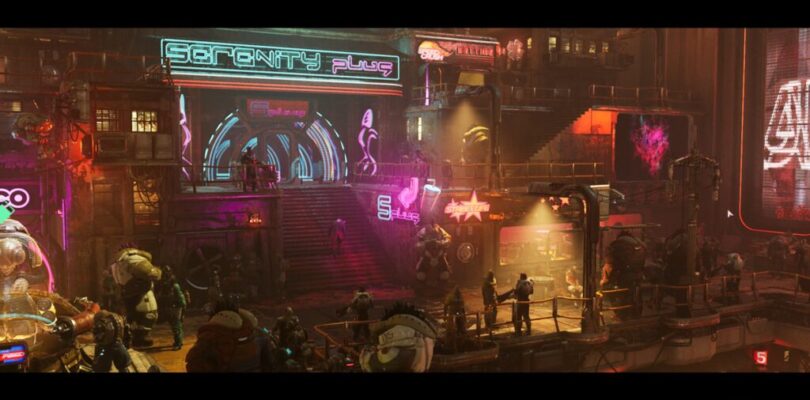The Ascent is a top-down shooter RPG set in a depressingly corporate cyberpunk future, developed by Neon Giant and published by Curve Digital. You’re a mean son of a bitch who just signed up to their newest job; life long work on this planet in return for not starving to death. You’re in luck though, cuz you have an appetite for violence and your boss, Poone, needs some work done. Join us as we climb out of the gutter in The Ascent PC review!
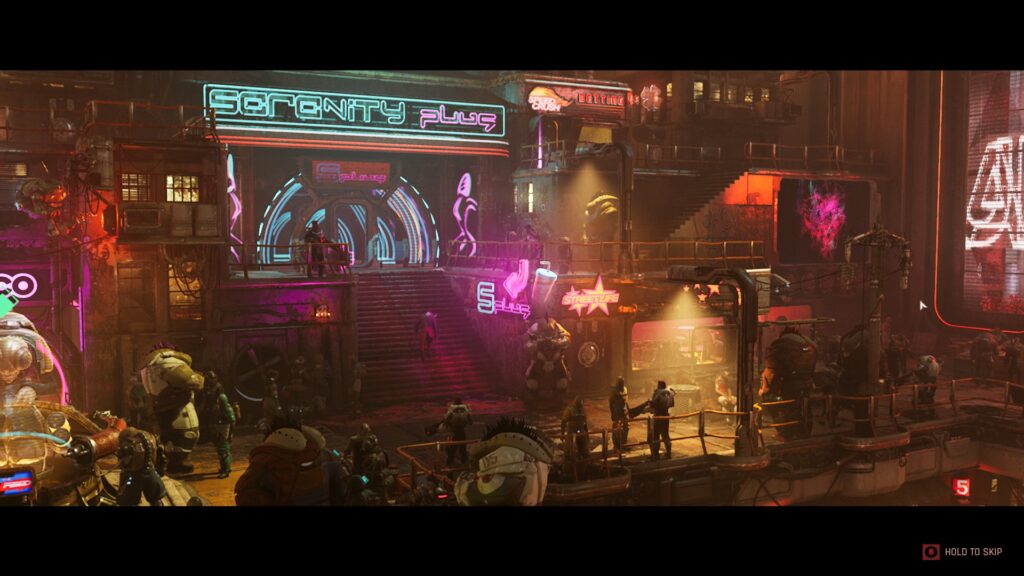
Contents
Story
The games story is simple. You are a nobody who is working as hired muscle for the local sector boss, Poone. He’s got a lot of problems that all need generous helpings of bullet to solve, and you happen to be his newest and brightest recruit. Someone is messing with the sector, and you’re paid to fix these messes as quickly as possible. Not cleanly though.
The story of The Ascent is more heavily based on the interactions you have with people to build up this bleak world view rather than over arching grand plot. The game has clearly been tailored to make you feel like everyone and everything in this place has problems that’ll haunt them forever, even if you help solve one or two along the way. Nothing feels good or bad here, it just feels like desperate people all clambering to get a piece of the pie.
One side mission I completed had me tracking down a corpse of a pilot that a man needed to cash in on the life insurance policy. He had fire in his eyes and was incredibly pissed off when I told him the corpse had been smuggled away under hush hush orders, to extract some isotope from her body. Spoilers for the mission, skip to the next paragraph if you want it fresh in game: The reason for this was the raw form of the isotope could only be refined inside living creatures, so they made a soda that contained the raw isotope and kept tabs on anyone who drunk it, snatching their bodies away when they died to extract it. That’s messed up, and her boss made you grab evidence to bring the whole operation down. Imagine my surprise when I go back to the bar to give him the evidence, only to see him take a wad of cash under the table from a dude in a suit, make you hand over the evidence, then say ‘It’s better this way, we all get paid’.
That was when I knew The Ascent knew exactly what it was doing. The revelation of that mission left me feeling hollow and angry, and that’s what this game is all about. You’re not a hero, you’re not doing any of this for the greater good. You’re doing it to stay alive, and maybe get a pay-check. Shut up and get on with it.
Every NPC that had speaking roles felt wholly unique and alive, even if all of them were pissed off in one way or another. There’s a clear power structure to the game, but ultimately there didn’t feel like a lot of reasons to become invested in the big picture of the game as someone who just takes orders and fires a gun. The main story is there and is solidly built, but it missed a sense of engagement for me, I was too busy taking in the smaller parts of the world.
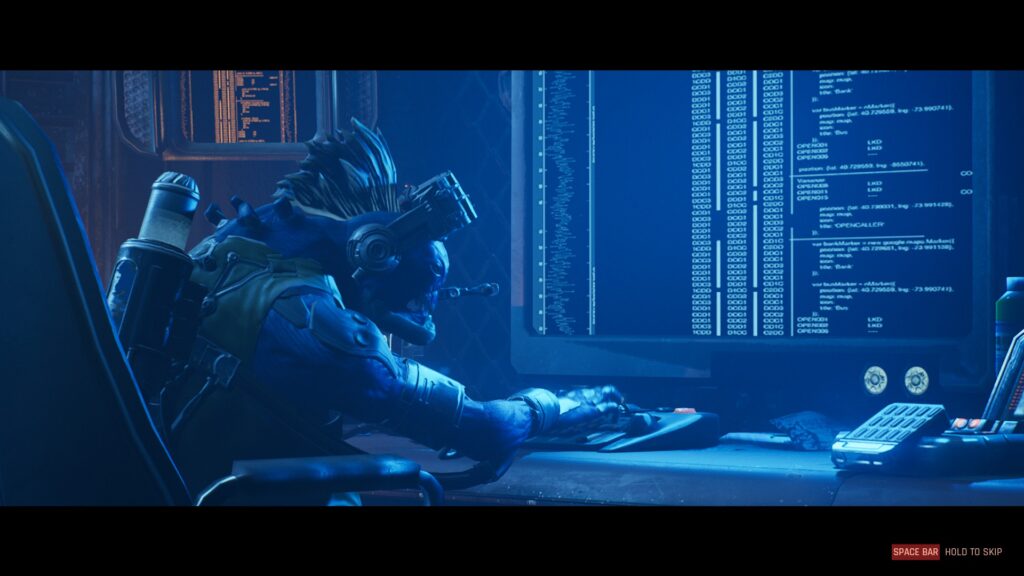
Gameplay
The gameplay of The Ascent is two fold; firstly there is a whole heaping load of customisation. If the story offers little choice, that can’t be said for the way you handle it. You get two guns, two abilities, and a tactical tool on you at any time to aid in combat. At the time of the review I had limited selections to choose from but the venders offered a lot more than I could afford, so there’s a great amount of variety to be had.
You can also equip armour and upgrade your skill points each time you level up, choosing to improve abilities like health, energy, critical hit, speed, etc. It’s standard but all these things together do feel like a fully fleshed out system. For a cyberpunk-esque game though the only hacking you do is based around getting into later areas or bypassing secret doors, which is a shame because that would be a great path to go down as you augment yourself. It’s all based around direct combat, but as a top-down RPG shooter that is really what the main bread and butter is, so I can’t knock it to hard.
As mentioned in the story section, you can take on side quests outside of the main storyline which is essential if you want to get some good stuff quickly, as everything costs a hell of a lot to purchase. After four main missions I only had enough u-cred for a quarter of a new ability, I’d never felt so poor in a game outside of monopoly. Then again, you don’t really need the upgrades.
There were only a handful of times the combat felt challenging, and even when you die there really seems to be next to no real penalty for it outside of making you pay attention and doing a little re-treading. There’s a cover system in place, which whilst useful for hoarding down groups of charging enemies, mercifully never feels entirely necessary and lets you move and shoot in a far more viscerally rewarding way. Once you only rely on the cover mechanic once you’re overwhelmed, the game becomes a made dash to kill enemies with all your guns and abilities as quickly as possible, making for very satisfying combat as you try to line them all up or blow up a barrel at the right time.
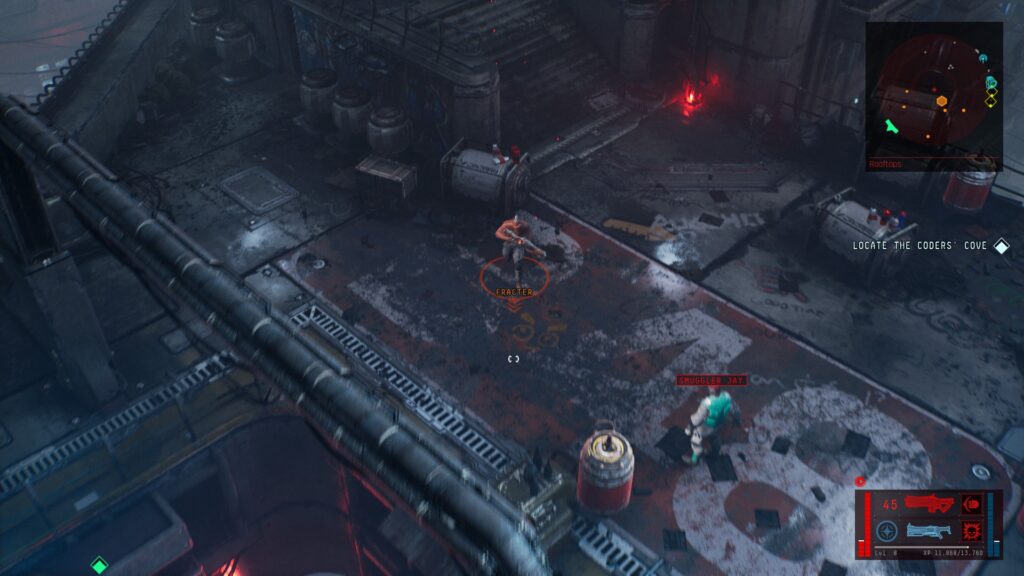
Graphics
The art style of The Ascent is lush and rich with care and imagination, at first. Once you boot up the game you’re immediately drawn into just how detailed everything feels. Signs and npc’s are everywhere, even the bare floor has a layer of dirt and grime to it that pulls you in. The top-down perspective really helps the atmosphere here, as you feel like a rat running through a city maze that has a never ending number of twists and turns.
But after you play for a while the saturation of detail starts to become its own worst enemy. You no longer notice the rich detail but just try to identify some unique sign on a building or just take in the general layout of an area to navigate. Admittedly, I didn’t get that far through the game in the time I had with it so later areas may have a more refreshing feel to change the pace but I strongly suspect it will be as saturated with visual detail as the earlier levels. The environment began to feel very samey as I ran down six different streets and realised I felt like I’d only moved down one in a weird looping pattern, because none of them felt distinct in feel or architecture.
Other than this minor gripe, the art style is mature and gritty with tons of neon lighting. A great visual feast, but there were was nothing to cleanse the palette against it.
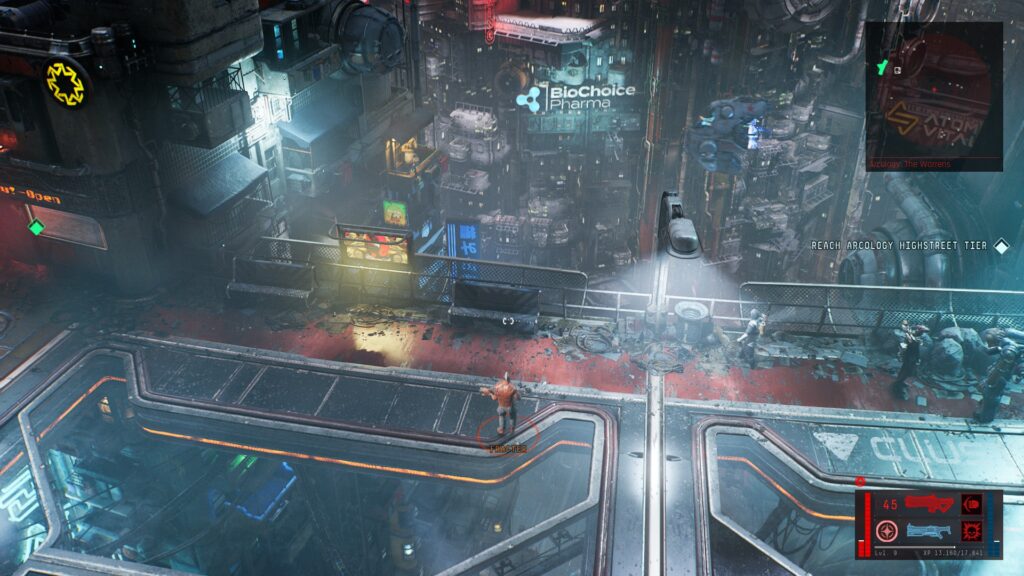
Sound
The sound design of The Ascent doesn’t have much to say outside the voice acting; the soundtrack never left a lasting impression on me, with audio cues in combat being present but never standing out to me as sensory data you process to make your next move, the combat is by and large a very visual medium in this game.
The voice acting for The Ascent is stellar, combined with the writing the few characters you interact with that are fully voiced are a treat to talk to, all drooling with venom and a cynical attitude. You really do get the feeling that no one likes anyone down here, yet you enjoy every interaction due the personality that comes pouring through with each conversation.
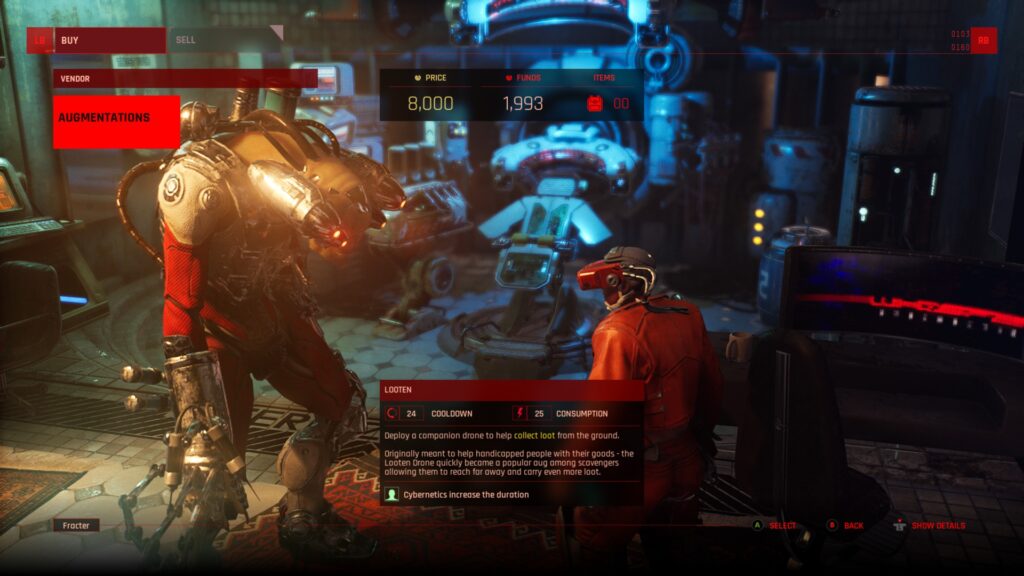
The Ascent PC Review: The Verdict
The Ascent is an atmospheric, bleak game that lifts you up by telling you its all just business and this is how things work. So it feels very structured and fun to run through clearing out goons and monsters alike, all with charismatic characters making your life harder every step of the way. There’s enough customization to really get your teeth stuck in to the combat which is tuned to be as chaotic and satisfying as possible, but the game falls short in making the story have any real push to it, and your endless gunning down of enemies will eventually give you a feeling of deja vu at places. That all said, if you like bleak and chaotic, I’d definitely recommend this game.
